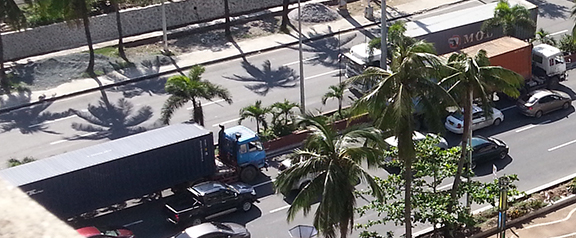
-
The Alliance of Concerned Truck Owners and Organizations (ACTOO) and Confederation of Truckers Associations of the Philippines (CTAP) seek relief from sustained fuel price increases
-
The high fuel prices may compel some truckers to stop operating
-
CTAP says a temporary fuel adjustment rate could provide much relief
-
Removal of excise tax on fuel will be beneficial, according to ACTOO
High fuel prices may force some truckers to halt operations, a situation that has already happened for some public utility vehicle drivers.
In separate interviews with PortCalls, the Alliance of Concerned Truck Owners and Organizations (ACTOO) and Confederation of Truckers Association of the Philippines (CTAP) said the unrelenting increase in fuel prices is jacking up costs, including for truck parts and accessories as well as maintenance.
The two organizations are looking to private sector and government interventions for relief from the additional costs.
They said they don’t expect government to intervene when it comes to trucking rates considering industry rates are deregulated. But CTAP president Maria Zapata said government can still help reduce truckers’ burden by removing “unnecessary expenses” incurred due to various policies, such as accreditation from various government agencies, truck bans, pass-through fees, and penalties for every minor offense.
Zapata said another intervention could be a temporary fuel adjustment, a measure easier to implement than negotiating new rates with each client. She said any adjustment may be easily removed once fuel prices stabilize.
CTAP issued in March a notice for a 30% rate adjustment, but this was not implemented industry-wide, subject as it is to individual negotiations between trucker and client.
RELATED READ: More truckers to hike fees by 30%
While Zapata said CTAP members are not planning to go on strike, truckers may be forced to halt operations due to high operating costs if they receive no relief.
ACTOO vice president Rina Papa agreed that truckers, especially the small operators, may stop operating due to higher fuel costs. She noted some truckers could refuse long-distance deliveries or deliveries from clients who do not agree to pay additional rates.
She acknowledged increasing rates is not realistic as additional rates will only be passed on to consumers, which include truckers and their families.
Fuel subsidies will be welcome, but Papa said she is not too optimistic of the measure either since it is not sustainable and cannot help truckers immediately. She explained the distribution of fuel subsidies would take too long based on the experience of public utility vehicle drivers.
Papa said removing excise taxes on fuel would be the most beneficial and immediate solution to the problem. She hopes this will be considered by the incoming administration.
The Department of Finance (DOF), in an earlier press statement, cautioned the next administration against suspending excise taxes on petroleum, saying it is not the most efficient approach to alleviating the conditions of affected sectors.
“The better and more equitable way to address the impact of increasing fuel prices is to provide swift and targeted support to the vulnerable sectors,” the DOF said.
The DOF said a suspension of excise taxes will reduce government revenues by P105.9 billion, or 0.5% of gross domestic product in 2022, resulting in a larger deficit and bigger government debt.
“Suspending the imposition of excise taxes on petroleum is also extremely regressive and primarily benefits higher-income households,” the DOF explained. – Roumina Pablo




